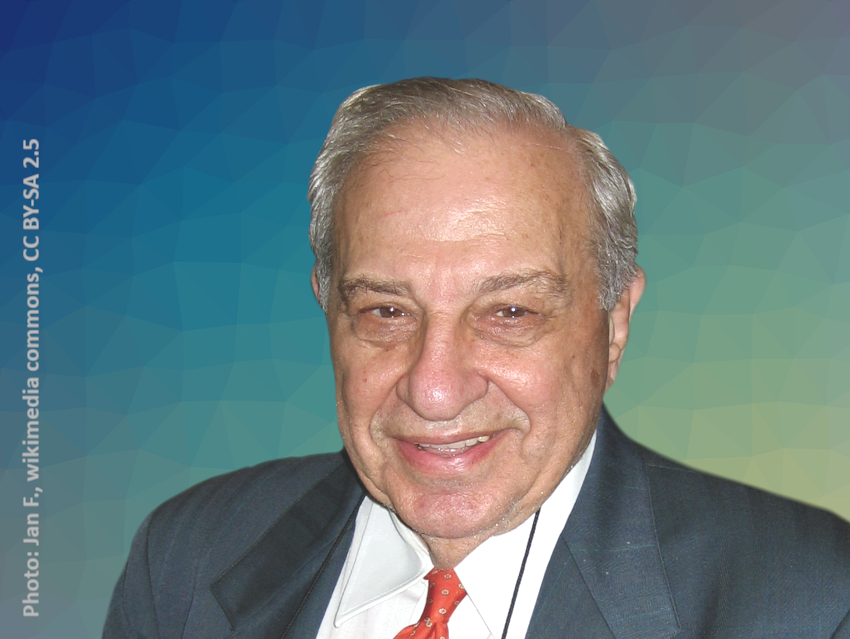Rudolph Arthur Marcus, California Institute of Technology (Caltech), Pasadena, CA, USA, and Nanyang Technological University, Singapore, celebrates his 100th birthday on July 21, 2023. Marcus received the Nobel Prize in Chemistry in 1992 “for his contributions to the theory of electron transfer reactions in chemical systems”.
Research
Rudolph Marcus is best known for the eponymous Marcus theory, which explains the rates of electron transfer reactions from an electron donor to an electron acceptor and for which he has received the Nobel Prize. Such electron transfer processes are key, e.g., in photosynthesis and many fundamental chemical reactions. The theory considers changes in the solvent around the reaction partners (the outer sphere) and uses the resulting changes in the system’s energy to predict the rate of the reaction.
Today, Marcus’ research covers a wide range of phenomena in chemical kinetics and related processes. Some examples are a theoretical model of elastically coupled reactions for investigations of F1-ATPase, an enzyme that catalyzes the formation of adenosine triphosphate (ATP), temperature-dependent phonon modes of CH3NH3Pbl3 thin films, the on-water catalysis of organic reactions in emulsions, the fluorescent intermittency of quantum dots, a theory for electron and hole injection from dyes into semiconductors, and dynamical and statistical theory analysis of ozone formation from the recombination of O and O2.
Career
Rudolph Marcus, born on July 21, 1923, in Montreal, Canada, studied chemistry at McGill University, Montreal, where he received his Ph.D. in 1946. He performed postdoctoral research at the National Research Council of Canada, Ottawa, and at the University of North Carolina, Chapel Hill, USA. He joined the Polytechnic Institute of Brooklyn, New York City, NY, USA, as Assistant Professor in 1951 and was promoted to Associate Professor in 1954 and to Full Professor in 1958.
Marcus then served as Professor at the University of Illinois at Urbana-Champaign from 1965 to 1978 and as Arthur Amos Noyes Professor of Chemistry at Caltech from 1978 to 2012. Since 2009, he has been a Visiting Professor at Nanyang Institute of Technology, Singapore, and since 2009, he has served as John G. Kirkwood and Arthur A. Noyes Professor of Chemistry at Caltech.
Awards & Honors
In addition to the Nobel Prize and many other honors, Rudolph Marcus has received an Alfred P. Sloan Fellowship in 1960, the Irving Langmuir Award in Chemical Physics from the American Chemical Society (ACS) in 1978, the Robinson Medal from the Faraday Division of the Royal Society of Chemistry (RSC) in 1982, the Wolf Prize in Chemistry in 1985, the Peter Debye Award in Physical Chemistry from the ACS in 1988, the U.S. National Medal of Science in 1989, the Lavoisier Medal from the French Chemical Society (SCF) in 1994, the Award in Theoretical Chemistry from the ACS in 1997, the Sesquicentennial Medal from the Polytechnic University, Brooklyn, in 2006, and many honorary doctorates.
Rudolph Marcus is a Member of the U.S. National Academy of Sciences, the International Academy of Quantum Molecular Science, the American Philosophical Society, and the International Panel of Advisors at the Institute of Advanced Studies at Nanyang Technological University, a Foreign Member of the Royal Society, London, and the Chinese Academy of Sciences, and an Honorary Member of the International Society of Electrochemistry, the Korean Chemical Society (KCS), the European Academy of Sciences, the National Museum of Emerging Science and Innovation, Tokyo, Japan, and the Institute for Advanced Studies, Technical University of Munich, Germany.
He also is an Honorary Board Member of the International Society of Theoretical Chemical Physics, the International Raoul Wallenberg Foundation, and the Angelo Roncalli International Committee, a Fellow of the American Academy of Arts and Sciences, a Foreign Fellow of the Royal Society of Canada, an Honorary Fellow of the Royal Society of Chemistry, the first Honorary Scientific Fellow of the Literary & Historical Society, University College, Dublin, and an Honorary Academician at Academia Sinica, Taiwan.
Selected Publications
- F1-ATPase Rotary Mechanism: Interpreting Results of Diverse Experimental Modes With an Elastic Coupling Theory,
S. Volkán-Kacsó, R. A. Marcus,
Front. Microbiol. 2022.
https://doi.org/10.3389/fmicb.2022.861855 - The Drude‐Smith Equation and Related Equations for the Frequency‐Dependent Electrical Conductivity of Materials: Insight from a Memory Function Formalism,
W.‐C. Chen, R. A. Marcus,
ChemPhysChem 2021, 22, 1667–1674.
https://doi.org/10.1002/cphc.202100299 - On the theory of charge transport and entropic effects in solvated molecular junctions,
J. K. Sowa, R. A. Marcus,
J. Chem. Phys. 2021.
https://doi.org/10.1063/5.0034782 - Elucidating the role of disorder and free-carrier recombination kinetics in CH3NH3PbI3 perovskite films,
C. La-o-vorakiat, T. Salim, J. Kadro, M.-T. Khuc, R. Haselsberger, L. Cheng, H. Xia, G. G. Gurzadyan, H. Su, Y. Ming Lam, R. A. Marcus, M.-E. Michel-Beyerle, E. E. M. Chia,
Nat. Commun. 2015.
https://doi.org/10.1038/ncomms8903 - Universal emission intermittency in quantum dots, nanorods and nanowires,
P. Frantsuzov, M. Kuno, B. Jankó, R. A. Marcus,
Nat. Phys. 2008, 4, 519–522.
https://doi.org/10.1038/nphys1001 - Evidence for a diffusion-controlled mechanism for fluorescence blinking of colloidal quantum dots,
M. Pelton, G. Smith, N. F. Scherer, R. A. Marcus,
Proc. Natl. Acad. Sci. 2007, 104, 14249–14254.
https://doi.org/10.1073/pnas.0706164104 - Electron Transfer Reactions in Chemistry: Theory and Experiment (Nobel Lecture),
R. A. Marcus
Angew. Chem. Int. Ed. 1993, 32, 1111–1121.
https://doi.org/10.1002/anie.199311113 - Electrostatic Free Energy and Other Properties of States Having Nonequilibrium Polarization. I,
R. A. Marcus,
J. Chem. Phys. 1956, 24, 979–989.
https://doi.org/10.1063/1.1742724 - On the Theory of Oxidation-Reduction Reactions Involving Electron Transfer. I,
R. A. Marcus,
J. Chem. Phys. 1956, 24, 966–978.
https://doi.org/10.1063/1.1742723


